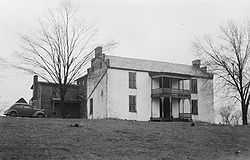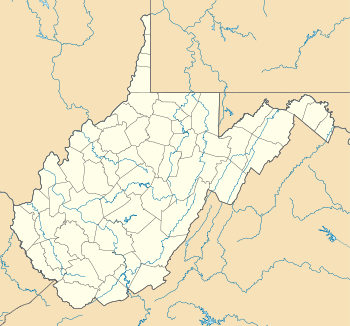Gap View Farm
|
Gap View Farm | |
 | |
|
Farmhouse in the 1930s | |
 | |
| Nearest city | Charles Town, West Virginia |
|---|---|
| Coordinates | 39°20′37.57″N 77°50′55.00″W / 39.3437694°N 77.8486111°WCoordinates: 39°20′37.57″N 77°50′55.00″W / 39.3437694°N 77.8486111°W |
| Built | 1774 |
| Architect | Walter Baker |
| Architectural style | Georgian, Colonial Revival |
| Governing body | Private |
| NRHP Reference # | 96001574 |
| Added to NRHP | January 9, 1997[1] |
Gap View Farm, near Charles Town, West Virginia, is a historic farm complex built in 1774. The farm was placed on the National Register of Historic Places on January 9, 1997.
Origin of name
The property gets its name from its view of the gap in the Blue Ridge made by the Potomac River at Harpers Ferry.[2]
History
Walter Baker came to then, Berkeley County, Virginia, in 1770 and began clearing the property.[2] A small limestone house was built by Baker in 1750, on property that was granted to Henry Lloyd by Thomas Fairfax, 6th Lord Fairfax of Cameron.[2] The main house of the farm was built by Baker in 1774.[2] At Baker's death in 1820, the property was sold by Baker's widow, Jacobina, to James L. Ranson.[2] When Ranson fell on hard times, he sold it to Parker Strode in 1868.[2] In 1871, the property was acquired by Charles Aglionby, who owned the adjoining Mount Pleasant estate and a portion of Media Farm.[2] Over time the house was expanded in four phases. In 1937, the farm was again sold to a family by the name of Barlett.[2]
In 1954, the farm was purchased by World War I veteran Frank Buckles and his wife Audrey (who died in 1999).[3] Their daughter Susannah was born there in 1955, and she returned to live there after her mother's death.[3] Buckles would ultimately become the last American survivor of World War I, and lived there until his death on February 27, 2011 at the age of 110.[4]
On January 9, 1997, the farm and property were placed on the National Register of Historic Places.[2][5]
Conservation
Susannah Buckles Flanagan, daughter of Frank Buckles,[6] and husband Mike Flanagan run the day-to-day operations of the farm and have made the farm more eco-friendly. In May 2008, volunteers planted over 1,000 trees and shrubs on the farm.[7]
Many local agencies have worked with the Flanagans to plant trees and shrubs, as well as wetland species of trees and shrubs, along the property's stream and wetland areas.[7]
The Flanagans also installed 15,000 feet of fencing as part land retirement program called the Conservation Reserve Enhancement Program.[8] The fencing separated the farm's conservation areas from the farm's other residents, 130 head of cattle.[8]
In July 2009, it was announced that the farm was in the running for the West Virginia Conservation Farmer of the Year, though it is unclear if the farm won.[8] The farm had won Jefferson County Conservation Farmer of the Year in 2009.[8]
In October 2009, the property was being "challenged" by development, causing the Flanagans to consider the West Virginia Agricultural Land Protection Program to prevent that from happening.[9]
References
- ↑ "National Register Information System". National Register of Historic Places. National Park Service. 2008-04-15.
- ↑ 2.0 2.1 2.2 2.3 2.4 2.5 2.6 2.7 2.8 Jean Crolius Ehman (June 1996). "National Register of Historic Places Nomination: Gap View Farm" (pdf). National Park Service.
- ↑ 3.0 3.1 Henry, Beth (2010-02-02). "Last living U.S. World War I vet turns 109". The Journal.
- ↑ "Rockefeller Honors World War I Veteran Frank Buckles of Charles Town". Office of Senator Jay Rockefeller. March 6, 2008. Retrieved 2009-11-11.
- ↑ "Gap View Farm". National Register of Historic Places. Retrieved 2011-03-13.
- ↑ Susannah Buckles, geni.com.
- ↑ 7.0 7.1 "West Virginia Success Story". West Virginia NCRS. Retrieved 2011-03-13.
- ↑ 8.0 8.1 8.2 8.3 Smoot, Naomi (2009-07-21). "Farm could earn honor". The Journal.
- ↑ "Gus's View". West Virginia Department of Agriculture. Retrieved 2011-03-13.
External links
 Media related to Gap View Farm (Charles Town, West Virginia) at Wikimedia Commons
Media related to Gap View Farm (Charles Town, West Virginia) at Wikimedia Commons- Historic American Buildings Survey (HABS) No. WV-11, "Gap View Farm, Charles Town vicinity, Jefferson County, WV", 2 photos
| |||||||||||||||||||||
